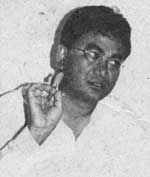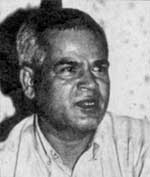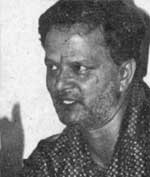Nepal is ruined economically. The political confusion has encouraged forces waiting to emerge again and the activities of foreign powers. The Maoists have a stranglehold over half the country, and the government has not taken initiatives that would help end the insurgency. Analysts and academics speak out.  Krishna Hachhethu,
Krishna Hachhethu,
political analyst
The budget allocation for the palace affairs has been increased to Rs 380 million from Rs 110 million last year, a good indicator of the direction the country is taking. Second, the palace and the army are gaining an upper hand in politics, as even the prime minister has admitted. Third, the interference of donor countries has increased as they monitor their investments, a sign that they have lost faith in Nepal.
The constitution and laws are misinterpreted and misused. The constitution allows the term of parliament to be extended by a year in extraordinary circumstances. A state of emergency is atypical, but parliament was dissolved. The constitution has also been manipulated with regard to local bodies.
Political parties are the platform through which the public can collectively express its dissatisfaction. They are expected to represent the people's voice when democracy is in crisis, but political parties are losing strength. Civil society has turned out to be a disappointment-they engage in self-censorship, and have failed to give voice to the people's concerns. It will likely take a couple of years for the first protests to erupt even if the Panchayati system were imposed again.  Dr Mahesh Maskey,
Dr Mahesh Maskey,
community health expert
We need to analyse what we have achieved and where we failed in the last 12 years. There aren't many points on which we can be assured that this political system is better for the public than the Panchayat was. The present constitution guarantees multiparty democracy and the sovereignty of the people, but has no provision that guarantees the people's right to hold a referendum for self-determination.
In the economic arena, the interim government formed following the restoration of the multiparty system tried to reduce the royal family's budget allocation a little bit, but no other government since has tried anything like that. This fiscal year Rs 380 million has been allocated for the royal family, and an additional Rs 230 million has been earmarked for the "development" of the royal palace. That puts the budget going to the royal family at Rs 610 million.
The state is in a massive crisis. Its anti-people characteristics are being revealed, and it is trying to protect itself. The state is not being supported by the parties that say they have taken a firm stand against reactionary forces. The government now has a choice: keep misusing power, or try to gain people's confidence through the elections.  Dr Krishna Khanal,
Dr Krishna Khanal,
political analyst
I would say that the present crisis is the by-product of our failure. This crisis will leave no space for the kind of participatory democracy we want. The Maoists now seem to be in the mood to compromise, the government is getting more militant, the other progressive powers are heading towards compromise. We need to watch out for the kind of 'progressiveness' this conflict is engendering.
The progressive powers that had the potential to improve things are more feeble than they have been in the past 50 years. The debates on democracy have weakened, and not just because of the emergency. The mindset of the rulers, Nepali Congress or CPN-UML, has not changed after 1990. That stagnation is the root cause of the present crisis, as is the failure to make changes.
People have started calling this constitution a compromise between the king, the Nepali Congress and the left front-the prime minister says that the three powers drafted the constitution, and it cannot be amended without their agreement. The king and the Nepali Congress are there, but the left front does not exist anymore. We do not have faith in the system we created, we failed in not developing ownership for it.  Dr Pitamber Sharma,
Dr Pitamber Sharma,
geographer
Our biggest failure has been in not decentralising economic and administrative power, without which participatory democracy is not possible. It took 12 years for a decentralisation act to be enacted, and it was bypassed the day it was enacted, a sign of how insensitive our political system is towards development issues.
In poor countries such as ours, the government's main objective should be to guide the rich and provide assistance to the poor. Instead, since the interim government was created, we adopted a market economy. Our governments have displayed more faith in a market economy than even The World Bank or the IMF. That created confusion about the role of the government in development attempts. For instance, the government totally neglected the public schools where 95 percent of children study, and concentrated on privatising the education sector, which put the underprivileged children at a disadvantage.
The government failed to be accountable to the people. The local bodies can play a vital role in making the government accountable to the people, but political parties are not committed. Regardless of their ideologies, party manifestoes ignore the idea of accountability. Civil society can contribute a lot, but we neglected the people, we failed to make commitments to empower them.


